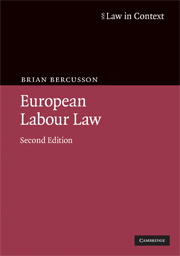Book contents
- Frontmatter
- Contents
- Preface
- Section I Labour law and Europe
- Section II The structure of European labour law
- 8 The institutional architecture of the European social model
- 9 A framework of principles and fundamental rights for European collective labour law
- 10 A framework of principles and fundamental rights for European individual employment law
- 11 The European Court of Justice, the EU Charter of Fundamental Rights and the European social model
- 12 General principles of enforcement of European labour law
- 13 Administrative enforcement of European labour law
- 14 Implementation and enforcement of European labour law and employment policy through the social partners at national and EU levels
- 15 Individual judicial enforcement of European labour law
- 16 Euro-litigation: collective judicial enforcement of European labour law
- 17 The European social dialogue: from dynamism to benign neglect 1993–2008
- 18 External and internal scrutiny of the democratic legitimacy of the European social dialogue
- 19 Threats and challenges to and the future of the European social dialogue
- Section III The futures of European labour law
- Index
- References
11 - The European Court of Justice, the EU Charter of Fundamental Rights and the European social model
from Section II - The structure of European labour law
Published online by Cambridge University Press: 05 June 2012
- Frontmatter
- Contents
- Preface
- Section I Labour law and Europe
- Section II The structure of European labour law
- 8 The institutional architecture of the European social model
- 9 A framework of principles and fundamental rights for European collective labour law
- 10 A framework of principles and fundamental rights for European individual employment law
- 11 The European Court of Justice, the EU Charter of Fundamental Rights and the European social model
- 12 General principles of enforcement of European labour law
- 13 Administrative enforcement of European labour law
- 14 Implementation and enforcement of European labour law and employment policy through the social partners at national and EU levels
- 15 Individual judicial enforcement of European labour law
- 16 Euro-litigation: collective judicial enforcement of European labour law
- 17 The European social dialogue: from dynamism to benign neglect 1993–2008
- 18 External and internal scrutiny of the democratic legitimacy of the European social dialogue
- 19 Threats and challenges to and the future of the European social dialogue
- Section III The futures of European labour law
- Index
- References
Summary
Introduction
The European Union's Charter of Fundamental Rights proclaimed at the summit held at Nice on 7 December 2000 became Part II of the proposed Treaty Establishing a Constitution for Europe. Under the proposed Reform Treaty of Lisbon, it is to have the same legal status as the Treaties.
The EU Charter includes provisions which are at the heart of labour law and industrial relations in Europe. The EU Charter will have an impact not only on the EU's institutions, but perhaps even more, on the Member States, also bound by the Charter through the doctrine of supremacy of EU law. The inclusion of fundamental rights concerning individual employment and collective industrial relations in an EU Charter may well confer on them a constitutional status within national legal orders. In some cases, the EU Charter's labour standards and industrial relations requirements may exceed those of some Member State laws. The European Court of Justice may adopt interpretations consistent with international labour standards, where again national labour laws may fall short. In sum, the EU Charter promises a renewal of labour law, both at European transnational level and within the Member States of the EU.
The role of the ECJ in enforcement of the EU Charter
The European Court of Justice becomes a central player in the enforcement of the EU Charter. The Court will decide disputes where Member States are charged with failing to implement, or allegedly violating rights in the EU Charter.
- Type
- Chapter
- Information
- European Labour Law , pp. 384 - 400Publisher: Cambridge University PressPrint publication year: 2009

